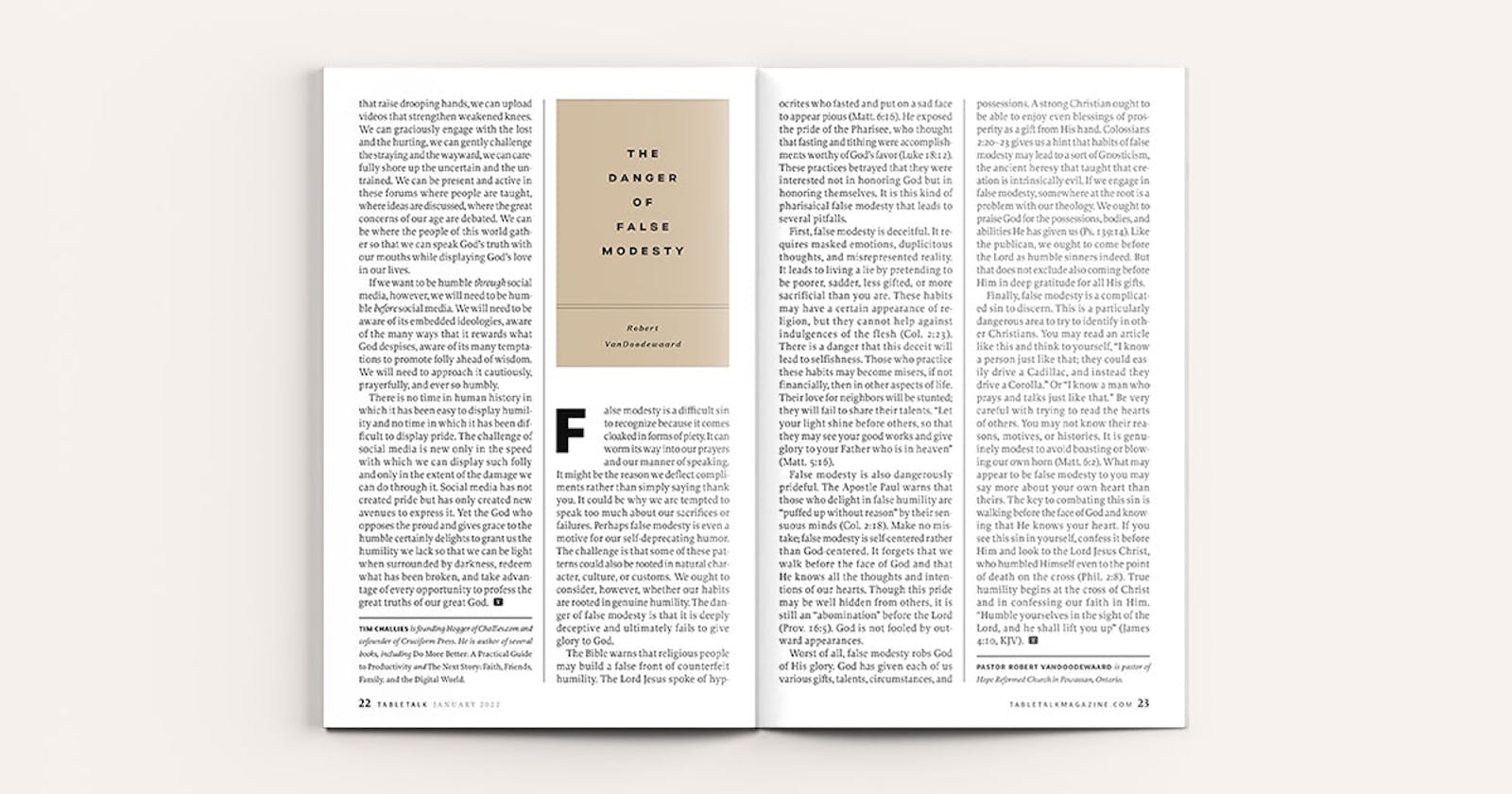
Request your free, three-month trial to Tabletalk magazine. You’ll receive the print issue monthly and gain immediate digital access to decades of archives. This trial is risk-free. No credit card required.
Try Tabletalk NowAlready receive Tabletalk magazine every month?
Verify your email address to gain unlimited access.
False modesty is a difficult sin to recognize because it comes cloaked in forms of piety. It can worm its way into our prayers and our manner of speaking. It might be the reason we deflect compliments rather than simply saying thank you. It could be why we are tempted to speak too much about our sacrifices or failures. Perhaps false modesty is even a motive for our self-deprecating humor. The challenge is that some of these patterns could also be rooted in natural character, culture, or customs. We ought to consider, however, whether our habits are rooted in genuine humility. The danger of false modesty is that it is deeply deceptive and ultimately fails to give glory to God.
The Bible warns that religious people may build a false front of counterfeit humility. The Lord Jesus spoke of hypocrites who fasted and put on a sad face to appear pious (Matt. 6:16). He exposed the pride of the Pharisee, who thought that fasting and tithing were accomplishments worthy of God’s favor (Luke 18:12). These practices betrayed that they were interested not in honoring God but in honoring themselves. It is this kind of pharisaical false modesty that leads to several pitfalls.
First, false modesty is deceitful. It requires masked emotions, duplicitous thoughts, and misrepresented reality. It leads to living a lie by pretending to be poorer, sadder, less gifted, or more sacrificial than you are. These habits may have a certain appearance of religion, but they cannot help against indulgences of the flesh (Col. 2:23). There is a danger that this deceit will lead to selfishness. Those who practice these habits may become misers, if not financially, then in other aspects of life. Their love for neighbors will be stunted; they will fail to share their talents. “Let your light shine before others, so that they may see your good works and give glory to your Father who is in heaven” (Matt. 5:16).

False modesty is also dangerously prideful. The Apostle Paul warns that those who delight in false humility are “puffed up without reason” by their sensuous minds (Col. 2:18). Make no mistake; false modesty is self-centered rather than God-centered. It forgets that we walk before the face of God and that He knows all the thoughts and intentions of our hearts. Though this pride may be well hidden from others, it is still an “abomination” before the Lord (Prov. 16:5). God is not fooled by outward appearances.
Worst of all, false modesty robs God of His glory. God has given each of us various gifts, talents, circumstances, and possessions. A strong Christian ought to be able to enjoy even blessings of prosperity as a gift from His hand. Colossians 2:20–23 gives us a hint that habits of false modesty may lead to a sort of Gnosticism, the ancient heresy that taught that creation is intrinsically evil. If we engage in false modesty, somewhere at the root is a problem with our theology. We ought to praise God for the possessions, bodies, and abilities He has given us (Ps. 139:14). Like the publican, we ought to come before the Lord as humble sinners indeed. But that does not exclude also coming before Him in deep gratitude for all His gifts.
Finally, false modesty is a complicated sin to discern. This is a particularly dangerous area to try to identify in other Christians. You may read an article like this and think to yourself, “I know a person just like that; they could easily drive a Cadillac, and instead they drive a Corolla.” Or “I know a man who prays and talks just like that.” Be very careful with trying to read the hearts of others. You may not know their reasons, motives, or histories. It is genuinely modest to avoid boasting or blowing our own horn (Matt. 6:2). What may appear to be false modesty to you may say more about your own heart than theirs. The key to combating this sin is walking before the face of God and knowing that He knows your heart. If you see this sin in yourself, confess it before Him and look to the Lord Jesus Christ, who humbled Himself even to the point of death on the cross (Phil. 2:8). True humility begins at the cross of Christ and in confessing our faith in Him. “Humble yourselves in the sight of the Lord, and he shall lift you up” (James 4:10, KJV).
